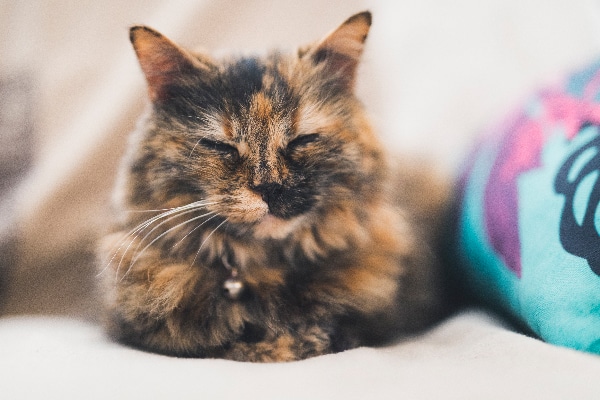What could former president of the United States Ronald Reagan and actress Lea Michele possibly have in common? They both added stray tortoiseshell cats to their families! President Reagan kept his two tortoiseshell cats, Cleo and Sara, at his California vacation ranch. It’s reported that Michele found her tortoiseshell cat, Sheila, on a Paramount studio lot. That’s the power of the “tortie” — one of the nicknames for tortoiseshell cats. So, what exactly are tortoiseshell cats, and what’s so special about tortoiseshell cats? Let’s find out!
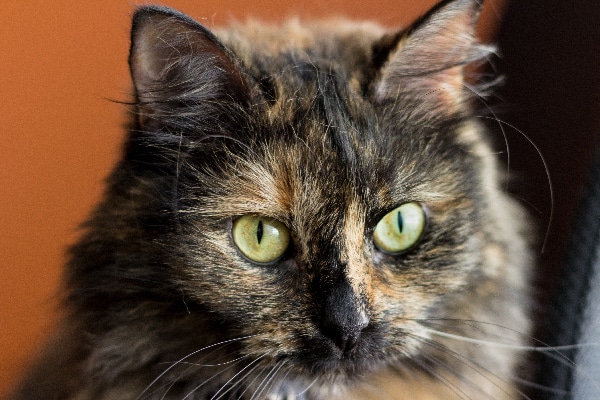
Tortoiseshell does not refer to a cat breed. Photography ©Justin Davis | iStock / Getty Images Plus.
1. Tortoiseshell cats are not a breed of cat.
Tortoiseshell cats have a combination of two colors, usually black and red. There are variations of the black and red, too — black can be diluted variants of brown or grey and the red can be diluted to cream, gold or orange. Torties are called tortoiseshell because the coloring of their coats looks like tortoiseshell.
Tortoiseshell was a highly prized material used in manufacturing everything from jewelry to furniture until 1973. CITES (Convention on International Trade in Endangered Species) banned the use of real tortoiseshell worldwide at that time since turtle and tortoise populations were being decimated. Synthetic tortoiseshell is still popular. “What does that have to do with cats?” … you may be wondering. Well, the color combination is rarer than most coat cat colorings.
2. Tortoiseshell cats are predominantly female; it’s in the genes.
The chromosome linked to coloring in cats is the X chromosome. Females have two X chromosomes, carrying the orange and black codes. Males have a tiny percent chance of displaying orange coat color. And to further confound things, female cat heterozygous display a combination of orange and black, aka tortoiseshell.
3. Piebald is not a reference to a hairless dessert.
While tortoiseshell cats are two colors, if white is present, the cat is now considered piebald. But you probably know them as “calico cats.” Although, outside the United States, this term is not popular.
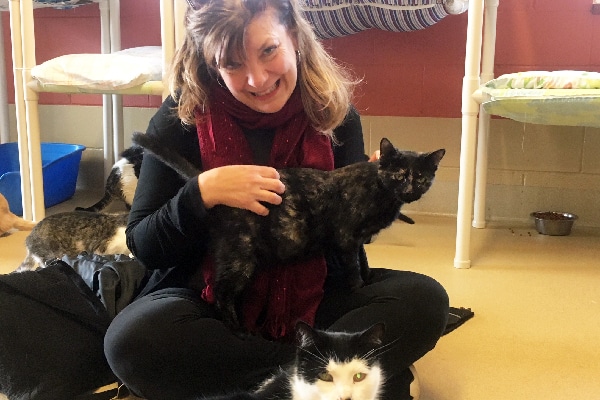
Sephora shows off her tortitude with shelter volunteer Diane Iannoccone. Photography by Denise LeBeau.
4. What about tortoiseshell cats and the much ballyhooed “tortitude?”
In an article on tortoiseshell cat personality, Maeve Conner gleans some insights from cat behavior expert and star of Animal Planet’s My Cat From Hell, Jackson Galaxy. “Galaxy says he has not found tortoiseshell cats to be feistier than average, but he does believe they tend to be ‘more sensitive to the stimulus around them.’”
I’ve seen some real chutzpah from tortoiseshell cats. At my local shelter, North Fork Animal Welfare League, the cats live in cage-free enclosures, with a large population of all kinds of felines. Volunteer Diane Iannoccone spends almost every free moment at the shelter socializing cats. Many of the cats are scared when they first enter the facility. One cat named Sephora caught Diane’s eye. Sephora is a young tortoiseshell cat who was shy at first. Diane went out of her way to help the kitty come out of her, um, shell!
After two weeks, Sephora wasn’t only feeling more acclimated, but made sure she was the queen of the hill. She beat out dozens of other cats to proudly perch on Diane’s lap. And, happily, Sephora got adopted into a loving home shortly thereafter. It could have been her “Meow First” personality that won her that coveted spot. While this could help prove that tortitude is true — is there any science behind it?
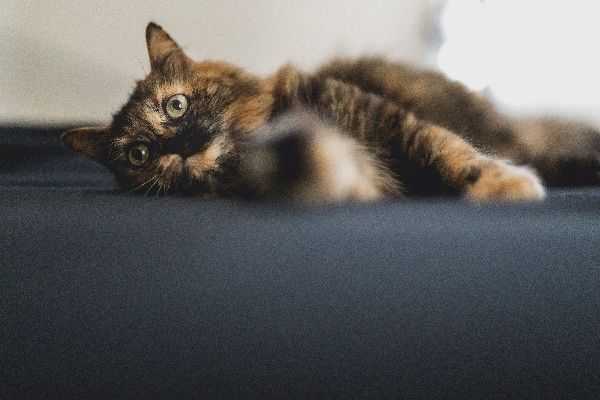
Is tortitude in tortoiseshell cats really a thing? Photography ©piranka | iStock / Getty Images Plus.
5. The tortitude heard around the world!
In 2016, articles touting tortitude spread faster than unchecked fleas in a cattery. Reputable publications such as the Sacramento Bee and the Seattle Times were sharing the results of a study released by University of California, Davis. The study, from a behavior expert at the highly respected UC Davis Veterinary Medical Teaching Hospital, was originally published in the Journal of Applied Animal Welfare Science. While the headlines were purporting “tortitude,” the reality is, “Researchers found no significant variations in aggression level associated with coat color at vets’ offices, despite common attitudes among veterinarians, technicians and shelter workers that some coat colors reflect cats with more peppery personalities.”
6. So, what are torbies?
Tortoiseshell coat coloring can mix it up in stunning ways when combined with tabby patterns. Yep, these types of tortoiseshell cats are called torbies.
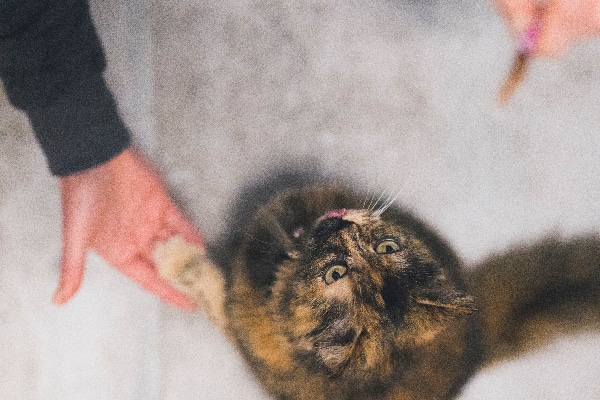
Some myths and legends surround tortoiseshell cats. Photography ©piranka | iStock / Getty Images Plus.
7. Tortoiseshell cats are legendary!
Cat expert and publisher of The Conscious Cat, Ingrid King, finds tortoiseshell cats so fascinating that she wrote a whole book about them. Tortitude: The BIG Book of Cats with a BIG Attitude features interesting tidbits. Ancient Celts believed it was good luck if a male tortoiseshell cat stayed in their home (with about 1 in 3,000 tortoiseshell cats being male, that’s some luck!). Japanese fishermen believed the males protected their ships from ghosts (again with the males!). It’s said that tortoiseshell cats bring money, have psychic abilities and see into the future. And if you dream about one, you’ll soon be in love (most likely with a tortie!).
Thumbnail: Photography ©piranka | iStock / Getty Images Plus.
This piece was originally published in 2018.
